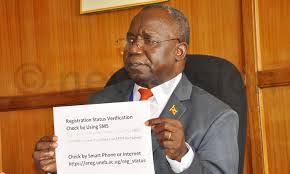
 Mama FM
Mama FM

 Mama FM
Mama FM
18 September 2025, 5:19 pm
By Byamukama Alozious
The Uganda National Examinations Board (UNEB) has convened a meeting with district, city, and municipal inspectors of schools to address pressing concerns in the examination process. Hon. Moriku Joyce Kaducu, Minister of State for Primary Education, emphasised the importance of inspectors in combating exam malpractice, noting that the government is committed to producing children who can make it in life and encouraged inspectors to play their role in ensuring the credibility of exam certificates.
Learners are being prepared to seat their primary leaving examinations of 2025 and UNEB Executive Director, Dan Odongo, says the issue of exam malpractice must be addressed, notes that some teachers and invigilators are involved in malpractices for personal gain. During a meeting with National school inspectors, he emphasised the need for collective action to combat this problem. He pointed out that, “The headteachers are making mistakes, you can find 30 pupils reported to have PWDs, low vision also a challenge but when our team visits the ground it’s not the case. What we have learnt is that it’s a form of malpractice and they want 45 minutes extra.” He also noted that “Sign language interpreters who are supposed to help the invigilators instead use the effect to interpret for learners on what to do.”
The inspectors were tasked to help UNEB combat this vice, with Mr. Nangosya Mike Madikye, Director of Examinations, emphasising the importance of collaboration between stakeholders, including inspectors, teachers, and parents, to address exam malpractice and promote sustainable assessment practices. Ayebazibwe Kellen, Inspector of Schools in Mbarara, emphasised the importance of embracing technology to reduce paperwork and protect the environment, while also playing a crucial role in preventing exam malpractice.
The meeting discussed the role of technology and artificial intelligence (AI) in examinations, with UNEB acknowledging the potential benefits of technology but also warning about the risks of malpractice through AI. The theme for the 2025 exams, “Embracing Security and Holistic Assessment of Learners in a Dynamic Environment,” remains relevant and will guide the examination process. UNEB has introduced digitisation processes, including the Assessment Management Information System (AMIS), to facilitate electronic services and reduce paperwork.
UNEB has also taken steps to address exam malpractice, including prohibiting the use of boda bodas to transport examination papers and printing individual timetables for all candidates. The board will impose stricter penalties for any violations, including disqualification and result cancellations. As the education sector continues to evolve, UNEB remains committed to promoting sustainable assessment practices and ensuring the credibility of exam certificates. By embracing technology, promoting capacity building, and fostering stakeholder engagement, UNEB aims to ensure the integrity and credibility of Uganda’s education system.